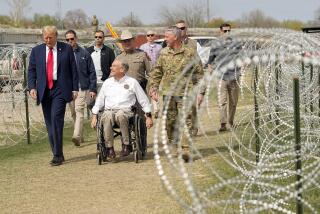Obama backtracking on detainee rights, critics say
Reporting from Washington — The newest option for detaining terrorism suspects -- an Afghan prison that serves the same purpose as the lockup in Guantanamo Bay, Cuba -- suggests that President Obama’s policies are becoming more like those of his predecessor, George W. Bush, in the view of human rights groups and legal experts.
Obama began his presidency vowing to close Guantanamo, end CIA detention practices and transform the post-9/11 system created by Bush. But the administration gradually has backtracked, and is now revisiting some of the practices in use under Bush: military tribunals, detention without trials and overseas prisons.
Human rights activists have objected to what they see as a trend in the administration toward favoring long-term detention of terrorism suspects and military commission proceedings rather than public court trials. In the latest possible shift, administration officials said last week that they may use a prison at the Bagram air base in Afghanistan for long-term detainees captured elsewhere.
“That would be George Bush’s wish list,” Christopher Anders, the senior legislative counsel for the American Civil Liberties Union, said of the possible policy changes.
The activists believe the administration is not unified on the issue, saying that Atty. Gen. Eric H. Holder Jr. believes the president should stick to the positions he outlined during the campaign, while others, including White House Chief of Staff Rahm Emanuel, see the detention issue more as a political problem.
The administration says no such divisions exist. The White House believes it must compromise with lawmakers to preserve Obama’s core detention policies.
Other officials said that without somewhere to hold and question terrorism suspects, capturing militants around the world becomes more problematic. At least in the short term, these officials said, Bagram could be used to hold extremists captured in other countries.
The proposal is controversial. Military officials, including the top U.S. and allied commander in Afghanistan, argue that using the prison for such detainees could complicate the war effort by providing a propaganda weapon that extremists could use against the U.S.
Sen. Lindsey Graham (R-S.C.), a leading Republican voice on detainee issues, said he considered concerns about Bagram legitimate, and considered it an option only as a stop-gap measure until another facility was ready.
“Bagram air base is not a long-term solution,” Graham said in an interview. “We’re not going to be able to count on that facility . . . it’s a sovereign government that’s not going to become enamored of being the jailer for America.”
Separate from the issue of Bagram, the administration is in talks with Graham on a deal that would let the administration buy a state prison in Thomson, Ill., to hold some of the detainees now at Guantanamo Bay.
Any proposal to move detainees to Thomson would require the approval of Congress, which overwhelmingly approved a ban on transferring terrorism suspects to the U.S. last year.
A deal with Graham is seen as a step that would allow some federal trials for detainees to go forward, although maybe not for the most prominent, such as alleged Sept. 11 organizer Khalid Shaikh Mohammed.
Holder announced in November that the Justice Department would prosecute the Sept. 11 plotters in federal court in New York. But New York city and state officials objected, and Republican lawmakers have tried to block funding for the trials.
Graham is pushing for wider use of military commissions, the special courts created under Bush that have been codified in U.S. law. Graham also would like a new law to allow the indefinite detention of terrorism suspects without trial, and changes in how detainees petition the courts for release under federal habeas corpus guidelines.
“We need a statutory framework to deal with the problem,” Graham said in an interview.
Graham said he wanted to establish regular annual reviews for detainees and create uniform standards for judges to use when deciding whether suspects should be released.
“To have someone spend the rest of their life in a military prison is OK with me,” he said.
Few Republicans want to close Guantanamo, but Graham said that a comprehensive deal between lawmakers and the White House that included his proposals could attract broader support.
Administration officials acknowledged that they had discussed changes in habeas corpus procedures with Graham, but said that no agreements had been made.
“They are simply talking and looking for common ground,” an administration official said, speaking on condition of anonymity because officials were not authorized to speak publicly on the issue.
But even talks on detainee issues worry human rights advocates. Many believe that any reform championed by Graham simply would be aimed at gutting court oversight of those in long-term detention.
And human rights officials also question whether the South Carolina senator can convince other Republicans to agree to shut down Guantanamo.
Opponents of Bush-era detainee practices hope that reports about White House shifts on its detention policies are simply trial balloons that the president himself will eventually pop.
“The policy of the Obama administration is that suspected terrorists should be tried in civilian courts wherever possible,” said Tom Malinowski, the Washington advocacy director of Human Rights Watch. “As far as I am concerned, that is their policy, and it is not accurate or fair to say Obama has embraced the policies of the Bush administration. And I hope they don’t.”
Christi Parsons in the Washington bureau contributed to this report.
More to Read
Sign up for Essential California
The most important California stories and recommendations in your inbox every morning.
You may occasionally receive promotional content from the Los Angeles Times.










